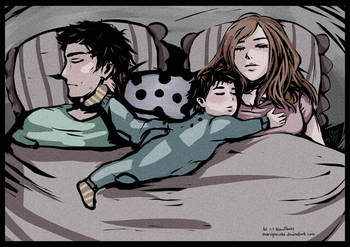
In the work of Sigmund Freud, the term Oedipus Complex refers to the idea that during the phallic stage of psychosexual development (3 to 6 years old) a young boy develops desire for his mother, and envy toward his father as a rival in a Love Triangle. The Oedipus Complex is successfully resolved when the boy begins to identify with his father as an indirect way to have the mother. The father becomes a role model rather than a rival.
The concept takes its name from Sophocles' tragedy Oedipus the King, wherein Oedipus kills his father and then marries and has sex with his widowed mother. Freud thought virtually no one would take it that far in real life, but described the events of the play as an Exaggerated Trope:
Freud infamously related basically everything to sex. Today, the idea that children are driven by unconscious sexual motives seems more like adults projecting an adult mindset onto children. As such, the pop-cultural subject of an Oedipus Complex is typically reimagined as a teen or adult.
Another tempered reimagining of the idea can be seen in the trope Jealous Parent. It has the same basic premise of jealousy in the parent-child triangle, but the jealous figure is the father rather than the son. The incest is removed; the father and son both desire the mother's affections, but the husband's desire is sexual while the son's is not. A baby literally needs his mother in a bodily, bone-deep, instinctual way that can be difficult for adults to fully imagine. The son may be possessively fixated on his mother, and that love may function jealously — just as sexual love does — without it actually being amorous.
Carl Jung later coined a Distaff Counterpart of the Oedipus complex: the Electra complex, where the conflict is between mother and daughter, named after another one of Sophocles' tragedies, Electra. Freud, however, rejected the idea.
Namesake
The namesake, Oedipus himself, is not an example. As a newborn it was prophesied that Oedipus would one day kill his father and marry his mother. He was abandoned by his biological parents, then found and raised by adoptive parents. Neither Oedipus nor his biological parents knew who they were to each other until it was too late. He was not someone who secretly wanted to kill his father and sleep with his mother — he desperately didn't want either, but ended up doing so anyway because You Can't Fight Fate.
Interestingly, though, in the play Jocasta (Oedipus's wife and unknowingly his mother) at one point comments that it's not especially unusual for people to have dreams of sleeping with their mothers, meaning the concept itself is Older Than They Think.
It's true that in their dreams a lot of men
have slept with their own mothers, but someone
who ignores all this bears life more easily.
Tropes associated with the term "Oedipus complex":
The Mother
- Incest Subtext: The term "Oedipus Complex" is often used as a byword for any incestuous mother-son implications, no rivalry with the father needed.
- Like Parent, Like Spouse: A son is interested in a woman who is like his mother, which may (or may not) be representative of desire for his actual mother.
- Love Triangle: Being interested in a woman who already has a partner.
The Father
- Child Supplants Parent: A son is his father's rival, seeking to take what is his or replace him. It usually doesn't involve cuckolding the father, although it could.
- Murder the Hypotenuse: Murdering a romantic rival to free up your love interest.
- Seduction as One-Upmanship: Seducing a man's wife in order to put one over on him. That man may or may not be your father.
